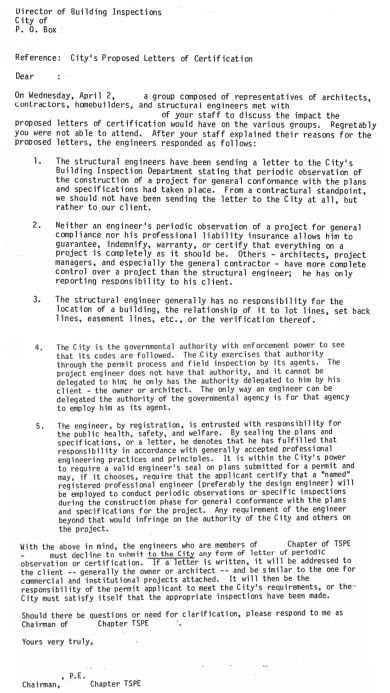dik
Structural
- Apr 13, 2001
- 26,063
I have an interesting issue that came up today, that I'll look into next week. The City of Winnipeg requires the following certification:
"I, Richard Coates, P. Eng., hereby certify that I or another suitably qualified person reporting to me have completed periodic reviews at appropriate stages of the structural aspects of construction of the building located at <Project Address> for which a building occupancy permit is being sought. I hereby represent that:
In my professional opinion the construction was carried out in substantial compliance with the applicable provisions of the Manitoba Building Code, the Manitoba Energy Code for Buildings, the Manitoba Plumbing Code and the Manitoba Fire Code and the plans submitted in support of the application for the building permit. This includes any additional plans, documents, review of plans and design decisions that have been part of my responsibility and related to Code issues applicable to my discipline that were not detailed as part of the submitted permit application.
I have informed the City in cases where I am aware that the construction has materially deviated from the submitted plans
I am not aware of any substandard workmanship, materials or assemblies that would compromise code compliance.
Sincerely,
Richard Coates, P.Eng.
Structural Engineer
They are unhappy that I'm striking out the portion of text shown... we'll see how it shakes out.
Dik
"I, Richard Coates, P. Eng., hereby certify that I or another suitably qualified person reporting to me have completed periodic reviews at appropriate stages of the structural aspects of construction of the building located at <Project Address> for which a building occupancy permit is being sought. I hereby represent that:
In my professional opinion the construction was carried out in substantial compliance with the applicable provisions of the Manitoba Building Code
I have informed the City in cases where I am aware that the construction has materially deviated from the submitted plans
I am not aware of any substandard workmanship, materials or assemblies that would compromise code compliance.
Sincerely,
Richard Coates, P.Eng.
Structural Engineer
They are unhappy that I'm striking out the portion of text shown... we'll see how it shakes out.
Dik

